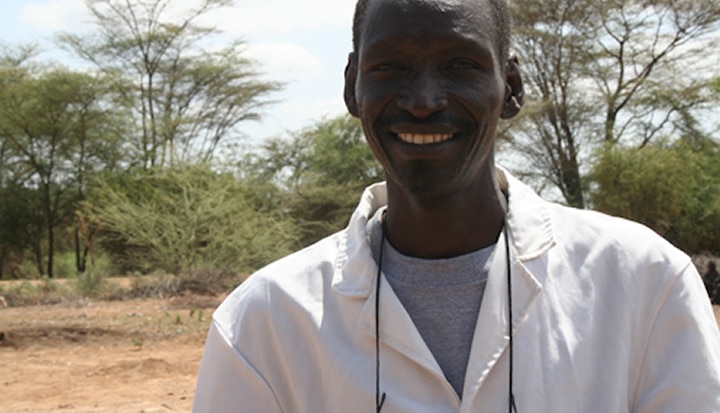The critical importance of community healthcare workers (CHWs) in Africa, where there are not enough doctors per person, cannot be overstated. They are the unsung heroes of African healthcare and there is a growing belief that they hold the key to dramatically improving mortality rates. Indeed it’s estimated that nearly 200,000 more CHWs are needed in Kenya alone to respond to current health needs. To add to the problem, the CHWs that do exist are usually unpaid, severely underequipped, undertrained and get little or no on-going support.
This is a growing problem. Community health in Africa is suffering. Africa represents 11% of the world’s population, yet carries 24% of the global disease burden with only 1.3% of the world’s health care workers to tackle this load. To add to this, staff retention can run as low as 30%. In Kenya, for example, even those community health workers who do gain the experience to be effective in their jobs often leave due to inadequate incentives, motivation, and support, leaving significant gaps in the health cadre (and up to 70% attrition rates). The government in Kenya has little to no information system to track and monitor this situation on a national level.
To tackle these challenges Accenture Development Partnerships, the non-profit arm of Accenture, Safaricom, the Kenyan mobile operator and subsidiary of Vodafone, and Mezzanine, an mHealth platform provider and application developer, have teamed up with the African Medical Research Foundation, AMREF (the original African Flying Doctors) to test the potential of mobile technology to support the learning needs of community health workers in Kenya. Funding has been provided by Accenture and the M-Pesa Foundation to design, build and pilot this solution, which we call AMREF Health Enablement & Learning Platform (HELP).
Our vision is to build a mobile health platform that provides a range of interrelated services and evolves over time as needs and technology evolve. We have started the journey with an mLearning service to provide complementary refresher training and continuous professional development to CHWs to help reinforce key-learnings and critical messages, which are aligned with the Ministry of Health CHW Curriculum in Kenya. Ultimately, our aim is to develop an accredited mobile learning academy, through which CHWs can gain credits aligned with the Ministry of Health curriculum. This could allow for CHWs to become certified and lay a path to formal employment and higher income, perhaps also addressing the motivation issues some CHWs suffer from. Our pilot has started with the six basic modules of the curriculum, and we are hoping to expand to the additional seven in 2014-15 to cover the full curriculum. We are currently using the technologies basic mobile phones to deliver the training, as a recent baseline study found that, while 97% of CHWs have phones, over 70% of those are still basic mobiles – thus our approach aims to take advantage of the technology that is widely available, while evolving to ‘smarter technologies’ over time.
The solution will also explore opportunities to link in additional content from other sources that CHWs can pull based on specific needs. We envision building a “core curriculum” that will certify a health worker has the necessary basic skills in her job, while then being able to offer additional “extracurricular courses or content” from organizations that are producing valuable, accredited health content (such as the mPowering Health Workers Initiative).
One great benefit of having partnered with Safaricom and Mezzanine is the ability to broaden the scope of services further, to include other applications which are already available or in development and could be integrated with mLearning, such as data collection, supply chain management, mobile payments, mobile insurance, etc.
The vision is a long-term one but one based on partnership. The pilot itself is due to begin early next year and will involve testing the mLearning service with 300 community health workers in Kenya in rural, urban and nomadic settings. The content is being developed by the Ministry of Health Technical Working Group, which is comprised of over 25 local organizations and their leading experts in health worker training. This represents a fantastic example of true cross-sector collaboration. The content is then being translated by a subset of these experts to fit the “mPedagogy” and be made available in the formats for basic mobile phones (e.g. SMS, USSD and voice recognition software). We will be conducting a number of “proof of concepts” with groups of CHWs to test their satisfaction with the solution, as well as their increase in knowledge and retention of the content delivered.
As ever with cross-sector partnerships, the aim is for each partner to work to their strengths in cooperation with the government and to ensure that all solutions are developed with the aim of replication and scaling up in mind. Innovation is never easy, particularly given the pioneering nature of the partnership, the mPedagogy and the technology, but with the partners we have brought together, we believe we are well positioned to make HELP a success and build for scale in the coming years.
I look forward to reporting back soon on our progress, and welcome ideas, feedback and discussion.
Accenture and Accenture Foundations have awarded AMREF a grant of US$1.4 million to take forward HELP. The award reflects Accenture’s global corporate citizenship initiative, Skills to Succeed, which plans to equip 500,000 people around the world by 2015 with the skills to get a job or build a business.
The M-PESA Foundation, the charitable trust funded by revenue generated from Vodafone’s mobile money transfer service M-PESA, will be providing funding of up to $600,000.










